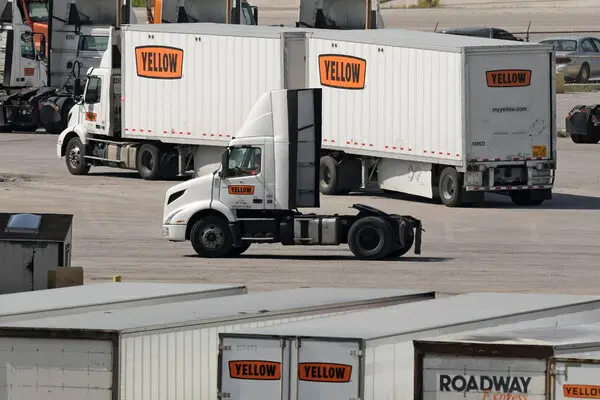Trucking Company Bankruptcies: Understanding Causes, Impacts & Legal Solutions

Strong 8k brings an ultra-HD IPTV experience to your living room and your pocket.
In recent years, the transportation industry has faced a wave of disruption — from fuel price volatility to supply chain breakdowns and labor shortages. As a result, trucking company bankruptcies have surged across the U.S., reshaping the freight economy and leaving countless employees, shippers, and creditors scrambling.
Whether you’re a fleet owner, supplier, driver, or legal professional, understanding the causes, impacts, and legal solutions behind these bankruptcies is essential for navigating today’s unpredictable trucking landscape.
🚚 Why Are Trucking Companies Going Bankrupt?
Several key factors are driving trucking companies to financial collapse. While each case is unique, the following challenges are common across many bankrupt carriers:
1. Rising Operating Costs
Fuel prices, insurance premiums, repair costs, and labor expenses have all increased. Many smaller and midsize carriers simply don’t have the capital to absorb these spikes without cutting essential services or falling behind on payments.
2. Falling Freight Rates
The post-pandemic freight boom led to over-expansion in the industry. As rates dropped in 2024–2025 due to reduced demand and increased competition, many carriers found themselves operating below break-even levels.
3. Driver Shortages
The shortage of qualified commercial drivers has forced companies to pay more for talent or operate with reduced capacity — both of which hurt revenue.
4. Excessive Debt from Overexpansion
During profitable periods, many trucking firms took on aggressive loans to grow fleets, open terminals, or lease equipment. When the market tightened, those debt obligations became unsustainable.
5. Regulatory Pressures
Increasing environmental and safety regulations add compliance costs, especially for small carriers without in-house legal teams or dedicated compliance officers.
⚖️ Legal Options for Trucking Companies in Financial Distress
Bankruptcy is not the end — it’s a legal tool that can either liquidate or restructure a business. Trucking companies typically file under Chapter 7 or Chapter 11 of the U.S. Bankruptcy Code.
🔸 Chapter 7: Liquidation
Operations are shut down.
Assets (trucks, trailers, equipment) are sold to repay creditors.
Employees are laid off.
Creditors may recover only a portion of what’s owed.
The business does not continue.
When to choose Chapter 7:
This is the right option if the company has no path to profitability and cannot meet its financial obligations.
🔸 Chapter 11: Reorganization
The company remains operational while restructuring its debts.
Contracts may be renegotiated.
Assets may be sold selectively.
Creditors are paid over time under a court-approved plan.
When to choose Chapter 11:
Ideal for companies with valuable infrastructure or customer contracts that make long-term survival possible, given a revised debt plan.
👷 Impact of Trucking Bankruptcies on Stakeholders
✅ For Drivers and Employees:
Sudden unemployment and unpaid wages
Difficulty reclaiming personal property (e.g., leased trucks)
Limited notice or severance
✅ For Creditors and Lenders:
Must file claims through bankruptcy court
Recovery depends on the company’s asset value
Secured creditors (like truck financiers) may reclaim assets
✅ For Shippers and Clients:
Freight delays and lost shipments
Contract disruptions
Need to secure new transportation providers quickly
✅ For Industry Partners (Fuel vendors, mechanics, brokers):
Unpaid invoices or breach of contract claims
Risk of legal entanglement as part of the bankruptcy process
📉 Real-World Trends in Trucking Bankruptcies (2024–2025)
Over 3,500 trucking companies reportedly shut down operations in the past 18 months.
The majority were small carriers with under 25 trucks, though several regional firms also filed.
Common traits included poor debt-to-income ratios, lack of diversification, and no legal contingency plan.
According to industry analysts, many of these bankruptcies were preventable with earlier legal or financial intervention.
🧾 How to Avoid Bankruptcy in the Trucking Industry
While market forces are unpredictable, companies can take proactive steps to reduce the risk of insolvency:
1. Financial Discipline
Monitor cash flow weekly.
Avoid overleveraging when expanding fleets.
Build a reserve fund for maintenance and emergencies.
2. Legal and Compliance Support
Maintain full DOT and FMCSA compliance.
Consult a transportation attorney regularly for contract reviews and liability assessments.
3. Diversified Revenue Streams
Don’t rely on one broker or shipper.
Expand services to include freight brokerage, warehousing, or last-mile delivery.
4. Modern Fleet Management
Use telematics and ELD data to optimize routes and fuel usage.
Retire aging equipment before maintenance costs spike.
5. Employee Retention Strategies
Offer competitive pay and benefits to retain skilled drivers.
Invest in training programs to reduce turnover.
👨⚖️ When to Contact a Bankruptcy Attorney
If your trucking company is:
Behind on loan payments
Facing lawsuits from creditors
Losing clients or drivers
Struggling to meet payroll
At risk of asset seizure or repossession
…it’s time to speak with a bankruptcy attorney who understands the transportation sector.
The earlier legal counsel is involved, the more options are available — including out-of-court restructuring, settlement negotiation, or Chapter 11 reorganization.
✅ What a Bankruptcy Lawyer Can Do for a Trucking Company
Review all active debt and contract obligations
Protect assets from immediate repossession or garnishment
Advise on the right bankruptcy chapter for your situation
Help manage employee and union issues
Represent the company in court proceedings
Handle creditor communications and claims
A lawyer can also help insulate owners from personal liability, especially if the company is a sole proprietorship or LLC with mixed finances.
🔄 Life After Bankruptcy: Is Recovery Possible?
Yes. Some carriers that file for Chapter 11 successfully:
Downsize their fleets
Focus on profitable contracts
Rebrand or pivot to brokerage or logistics
Resume operations under better financial terms
Even after Chapter 7, former owners may use the experience to launch more sustainable businesses — especially with legal and financial guidance from the beginning.
https://cameronbankruptcylaw.com/truckers-and-bankruptcy/
Note: IndiBlogHub features both user-submitted and editorial content. We do not verify third-party contributions. Read our Disclaimer and Privacy Policyfor details.


